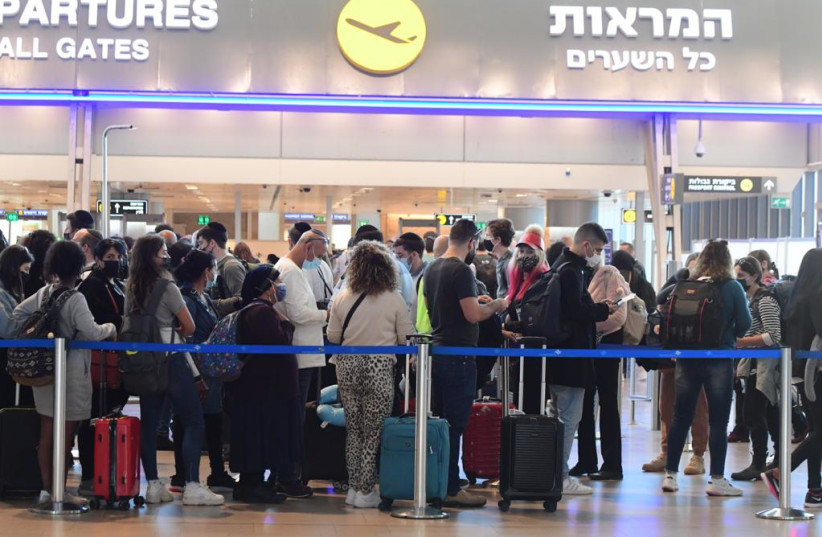Israel again hit a record of daily cases on Wednesday, with 48,282 virus carriers identified through 433,000 tests including both PCRs and antigens, Health Ministry data showed on Thursday.
In addition, the number of serious patients also increased. As of Thursday morning, they stood at 287, which is 40 more than on Wednesday. At the same time, the figures of patients on ventilators only increased slightly– to 69 compared with 64 on Wednesday – while those on extracorporeal membrane oxygenation (ECMO) machines that are used for the most severe patients remained stable at 12.
All patients on ECMO and 58% of those intubated were not vaccinated.
“There are two significant risk factors for a patient infected with the disease,” Corona Commissioner Prof. Salman Zarka said at a news briefing. “The first is age: most patients hospitalized in a severe and critical condition are over 60. The second is the vaccination status. People who are not vaccinated with the third dose or a fresh dose are at risk.”
In addition, 27 Israelis succumbed to the virus in the past seven days, a 92% increase compared with the previous week. Israel’s death toll stood at 8,293.
At the same time, the numbers of seriously sick and deaths during the Omicron wave have remained much lower than those of previous waves.

In January 2021, Israel saw up to 1,200 active serious patients and a total of 1,443 deaths. In September, during the peak of the Delta wave, there were over 750 serious patients and 678 Israelis died of corona, which is an average of 22 people a day. So far 39 people have died this month, or an average of three a day.
Serious disease and deaths tend to be delayed several days, if not weeks, compared with infections. Experts have therefore warned that Israel is likely to see serious cases rise to 2,500 a day, severely straining the health system.
Currently the biggest challenge is the prospect of an increase in hospitalized patients – not only due to COVID but also the flu and other seasonal viruses – in spite of staff shortages. As of Thursday, 6,722 medical personnel were in quarantine, over a thousand more than the day before, including 923 doctors and 1,774 nurses.
“At this point in time, two weeks after the beginning of the fifth wave, according to most estimates, we were expecting to receive and treat a larger number of hospitalized patients, including critically ill patients,” said Samson Assuta Ashdod Hospital General Director Dr. Erez Barenboim.
The hospital only had 25 patients with corona, mostly admitted because of other problems, and no one in serious condition.
“We still have a long way to go, but we can speak in terms of cautious optimism,” Barenboim said. “However, I am much more concerned about the constant increase in the number of medical staff in isolation. As their number rises, it will be more difficult for the health system and the hospitals to provide various medical and health services.”
In order to alleviate the situation, Zarka said that the ministry was mulling asking the hospitals to reduce or stop non-urgent treatments and procedures.
“In this situation, there is a burden on the health system,” he said. “We are considering reducing non-urgent services as much as required and in accordance with the situation of each hospital.”
The corona commissioner said that he very much believed in the principle of allowing life to continue alongside the pandemic. At the same time, he said that if he and other experts at the ministry reached the conclusion that more restrictions were needed, they would not hesitate to recommend them.
“We are not going to suggest measures that we do not think will work,” Zarka said. “I cannot promise there will not be a lockdown, and when I say lockdown I have in mind the first one, when people were not allowed to go more than 100 meters from their home. But I do not think we will need to get there.”
